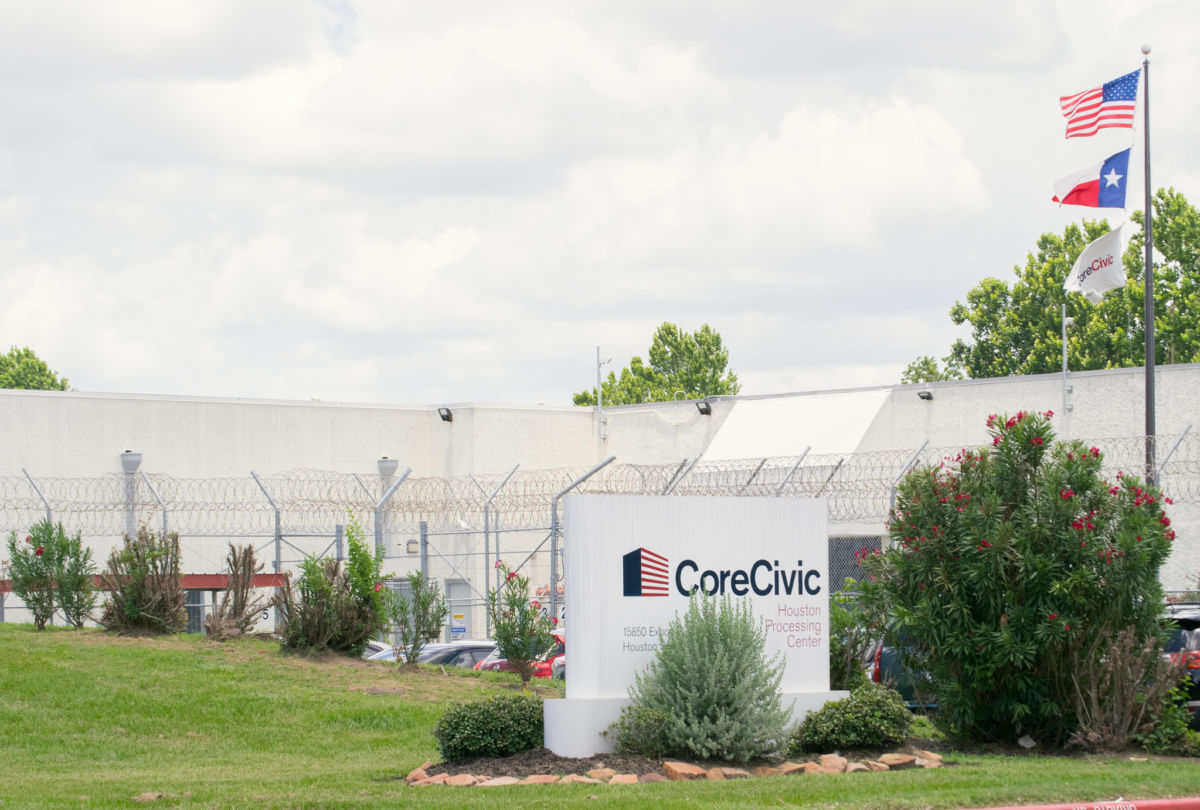As of August 2019, eight banks – JPMorgan Chase, Wells Fargo, Bank of America, SunTrust, BNP Paribas, Fifth Third Bancorp, Barclays, and PNC – have publicly committed to ending their future financing relationships with the private prison industry, including CoreCivic and GEO Group. Together these eight banks represent an estimated $2.35 billion – or 87.4% – of the credit lines and term loans that are central to these companies’ operations.
Notably, all of the banks that provide credit and term loans to GEO Group have committed to end their future financing relationships with the industry. These commitments are the result of ongoing campaigns from #FamiliesBelongTogether and #BackersOfHate to end Wall Street’s financing and profiting off of the private prison industry.
This mass exodus of banks has had a cascading effect on the industry. Fitch Ratings, one of the three premier credit rating agencies, recently downgraded CoreCivic from BB+ to BB. This downgrade will make it more difficult for CoreCivic to secure the plentiful, cheap credit and loans they have accessed in the past.
Moreover, California’s $356 billion pension fund, CalPERS, is now considering divesting from the industry due to “egregious activities” at the border and the increased riskiness as banks continue to flee. Finally, CBS MoneyWatch reported that stock values for CoreCivic (CXW) and GEO Group (GEO) have been cut in half since April 2017.
Estimated Impact on CoreCivic and GEO Group’s Future Financing
As shown in the chart below, these eight banks provide an estimated combined $2.352 billion of GEO and CoreCivic’s financing, or 87.4% of the total financing currently available to these private prison companies. Given the eight banks’ commitments to provide no new financing, GEO Group and CoreCivic will potentially face a $2.352 billion shortfall when the current agreements expire.
| GEO Group | CoreCivic | CoreCivic | |
| Line of credit & term loan* | Line of credit | Term loan | |
| JPMorgan Chase | $282,000,000 | $112,000,000 | $28,000,000 |
| Bank of America | $282,000,000 | $112,000,000 | $28,000,000 |
| SunTrust | $282,000,000 | $112,000,000 | $28,000,000 |
| Wells Fargo | $282,000,000 | ||
| BNP Paribas | $282,000,000 | ||
| Barclays | $282,000,000 | ||
| PNC | $112,000,000 | $28,000,000 | |
| Fifth Third Bancorp | $80,000,000 | $20,000,000 | |
| Total | $1,692,000,000 | $528,000,000 | $132,000,000 |
| Grand Total | $2,352,000,000 |
Source: U.S. Securities and Exchange Commission filings for GEO Group and CoreCivic
* While GEO Group reports its total credit line and loan debt, it does not make specific commitment amounts for each participating bank publicly available. The breakdown in this table is an estimate.
As Real Estate Investment Trusts (REITs), CoreCivic and GEO Group are able to keep their income taxes low as long as they pass on much of their income to shareholders. This means that these companies depend heavily on short term borrowing through lines of credit and loans to keep their operations funded day-to-day. An 87.4% shortfall in the availability of that financing could therefore materially impact their ability to do business as usual.
The Industry Response
Indeed, these companies can no longer deny the writing on the wall. GEO Group’s March 2019 quarterly report acknowledged the impact of these shifts:
“Public resistance to the use of public-private partner- ships for correctional, detention and community-based facilities could result in our inability to obtain new contracts or the loss of existing contracts, impact our ability to obtain or refinance debt financing or enter into commercial arrangements, which could have a material adverse effect on our business, financial condition and results of operations.”
In their August 2019 Q2 investor call CoreCivic’s CEO Damon Hininger derided the banks’ decisions to no longer finance his company:
“Despite many of the banks claims of conducting a thorough review process, they clearly bow down to a small group of activists protesting and conducting targeted social media campaigns pushing false information rather than engage in a constructive dialogue about the facts… The most disappointing aspect of these politicized bank decisions, disingenuous activists efforts, and no solution proposals from politicians, is the people who they ultimately hurt. It hurts the American people because of poor policies are being discussed, made or awarded based on misinformation rather than an open and honest dialogue on the challenges at hand.”
From GEO Group’s inclusion of public resistance in their SEC filing and the CoreCivic CEO’s tone on the investor call, it is clear that these companies are on the defensive and recognize the financial impact they are facing.
We have 9 days to raise $50,000 — we’re counting on your support!
For those who care about justice, liberation and even the very survival of our species, we must remember our power to take action.
We won’t pretend it’s the only thing you can or should do, but one small step is to pitch in to support Truthout — as one of the last remaining truly independent, nonprofit, reader-funded news platforms, your gift will help keep the facts flowing freely.
